The Borgen Project
The Borgen Project is a non-profit organisation raising awareness for global poverty by mobilizing ordinary citizens and pushing for positive change. Student Comms caught up with Mohammed Farrash, third year International Social and Public Policy student, currently interning for the organisation. 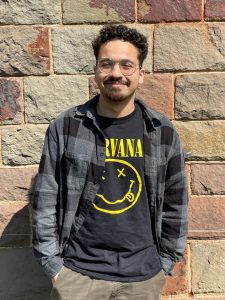
Mohammed, how did you find The Borgen Project?
It was an accident really, I was looking for some work experience, as I’m now in my third year, and I kind of found this project through other organisations.
What are the main beliefs of the project?
The Borgen Project aims to tackle global poverty. The belief is that tackling this massive concern will impact other global issues, such as public health, overpopulation, and national security, as well as creating more jobs for the future.
So, what work do you do with the project?
I get set tasks weekly, usually sending emails to MPs and helping to mobilise others to do the same. I also research current world events, help fundraisers, network, and investigate current bills going through Parliament. All the work is done online, as there isn’t an office in Bristol. I usually spend around 8 hours a week completing work for them.
Are there any surprises that have come up in this work? What successes have you been able to enjoy?
This has been my first work environment, so it’s been interesting to see just how much you can accomplish from just talking to people. Just getting the internship was such an achievement, the acceptance rate is quite low. It’s been great to connect with people within my community.
Is this something you’d like to focus on in your future career?
Honestly, I’m not sure yet. There’s so much that I would like to explore in the world, but I wouldn’t rule it out. In terms of career, I am originally from Saudi Arabia, and I would love to be able to contribute to The Vision 2030 and help bring Saudi Arabia into the future. One of the main objectives of the Vision 2030 is to strengthen national identity by sharing our culture with the rest of the world.
And what brought you to Bristol?
So, I graduated from school during COVID-19, my exams were cancelled, and I didn’t end up with the grades that I wanted. I originally wanted to apply to study finance but didn’t meet the requirements. I ended up going through clearing to just try and find a spot doing something. I planned to get onto a course and then change programmes, but after a few weeks in International Social and Public Policy, I realised I was really interested and decided to stay. I don’t regret that decision. Bristol was so helpful when I emailed in during clearing and made me feel that this place would value me. My mother is an Alumna here – she did a masters in Blood Banking; she’ll hopefully be coming over from Saudi Arabia for my graduation soon.
What’s been your favourite thing about Bristol?
The food! I’ve discovered so many cuisines that I haven’t experienced before. I love the local food markets and I’ve now discovered vegan food. I never really liked vegan food before, but now it’s one of my favourites. Living alone has really let me work on my cooking skills, my favourite food to cook is definitely Indian dishes.
What do you need to do now that you’re nearing the end of your internship?
I’ll be filling out my feedback survey and sending that in. This blogpost will probably be the last thing I do for it. I’ve enjoyed my time as an intern with the project and would recommend internships to other students.
You can learn more about The Borgen Project at The Borgen Project.
To get advice on internships, volunteering and career opportunities, get in touch with The Careers Service.


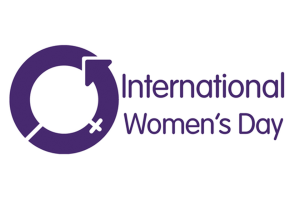
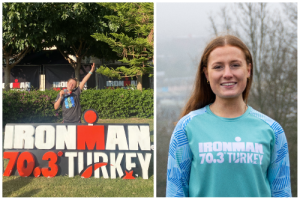 Megan Hamill, a final year student overcame an eating disorder to complete a half Ironman. Now she’s
Megan Hamill, a final year student overcame an eating disorder to complete a half Ironman. Now she’s 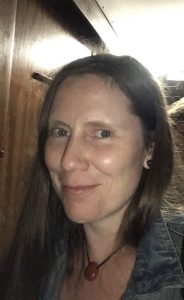 I did a master’s in social work at Bristol University and I guess my dissertation and work as a student social worker inspired me to do what I’m doing now. Alongside this, the project also stems from personal and professional experiences of male bias and seeing how this plays out time and time again in research, practice and day-to-day life.
I did a master’s in social work at Bristol University and I guess my dissertation and work as a student social worker inspired me to do what I’m doing now. Alongside this, the project also stems from personal and professional experiences of male bias and seeing how this plays out time and time again in research, practice and day-to-day life. It’s quite a few things really. Even though there is research that might talk about autistic women or autistic people, it might not even report on sexuality or race. If you just talk about the LGBTQ+ community specifically, research shows that mental health outcomes are poorer, and then you throw autism into the mix and it’s even poorer again. So yes, it would be great to raise awareness, not just about getting support, but knowing that the support is there. The funny thing is that although there’s all this medicalised talk going around with autism, the way you get a diagnosis is through behaviour. So it’s a very socially diagnosed label and a lot of people don’t realise they’re entitled to social care support.
It’s quite a few things really. Even though there is research that might talk about autistic women or autistic people, it might not even report on sexuality or race. If you just talk about the LGBTQ+ community specifically, research shows that mental health outcomes are poorer, and then you throw autism into the mix and it’s even poorer again. So yes, it would be great to raise awareness, not just about getting support, but knowing that the support is there. The funny thing is that although there’s all this medicalised talk going around with autism, the way you get a diagnosis is through behaviour. So it’s a very socially diagnosed label and a lot of people don’t realise they’re entitled to social care support.
 I started my PhD in a different area of research, looking at alternative economies. I think it was something like 2012, 2013, and I just came across RuPaul’s Drag Race. I got hooked to the point that I nearly stopped finishing my PhD! I watched all the series that were out there, and I kept watching it again and again and again!
I started my PhD in a different area of research, looking at alternative economies. I think it was something like 2012, 2013, and I just came across RuPaul’s Drag Race. I got hooked to the point that I nearly stopped finishing my PhD! I watched all the series that were out there, and I kept watching it again and again and again!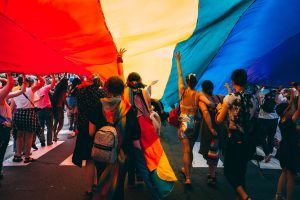 I am an advocate of Pride as a protest, I think that’s the function of Pride, rather than having a parade of corporate sponsorships. Effectively, as they became a brand, they also become more commercialized. I think Pride is a bit of a crossroad in terms of what it represents. Pride really has to reconfigure what they stand for.
I am an advocate of Pride as a protest, I think that’s the function of Pride, rather than having a parade of corporate sponsorships. Effectively, as they became a brand, they also become more commercialized. I think Pride is a bit of a crossroad in terms of what it represents. Pride really has to reconfigure what they stand for.  Yes, there are the very young people! Though we don’t yet have many of them in our research interviews. We have people more or less my age, that went through being in the closet when they were younger, that hardship there. And we’ve interviewed older people, who have been through the same thing, but they’re also really attracted to this fabulousness of drag queens!
Yes, there are the very young people! Though we don’t yet have many of them in our research interviews. We have people more or less my age, that went through being in the closet when they were younger, that hardship there. And we’ve interviewed older people, who have been through the same thing, but they’re also really attracted to this fabulousness of drag queens!
 I think that, within academia, there is a real appetite for understanding how laws, social structures and cultural practices negatively impact the lives of LGBTI+ populations. In recent times, the UK, particularly our different funding bodies, has been good in terms of providing resources for LGBTI+-focused research, and in encouraging and creating relevant conversations within academic spaces. At present, there are numerous academics across the UK who are undertaking really important studies into the lives and experiences of LGBTI+ communities.
I think that, within academia, there is a real appetite for understanding how laws, social structures and cultural practices negatively impact the lives of LGBTI+ populations. In recent times, the UK, particularly our different funding bodies, has been good in terms of providing resources for LGBTI+-focused research, and in encouraging and creating relevant conversations within academic spaces. At present, there are numerous academics across the UK who are undertaking really important studies into the lives and experiences of LGBTI+ communities.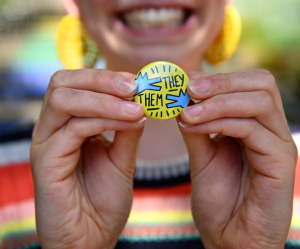
 In the first of this week’s blogs focusing on research we are talking to the vibrant Dr Sarah Jones, a lecturer and researcher in the Department of History. Dr Jones’ teaching in
In the first of this week’s blogs focusing on research we are talking to the vibrant Dr Sarah Jones, a lecturer and researcher in the Department of History. Dr Jones’ teaching in  The big motivation behind the Jenny project is the fact that queer histories, and especially trans histories, are often told through what we would consider regulatory bodies, so we tend to hear about people when they’re arrested, or oppressed in some way, or when horrible things are happening to them. And that’s obviously a really important thing to look at and understand, but it also means that you don’t really get that much of a sense of these people as real, living people. History has often tended to focus on victimisation, oppression, and persecution – what Tom (Marshman) wanted to do is think about different ways we could look at the archive and build a more rounded, human story about someone like Jenny. Just a wonderfully complicated person living a complicated life in a complicated moment.
The big motivation behind the Jenny project is the fact that queer histories, and especially trans histories, are often told through what we would consider regulatory bodies, so we tend to hear about people when they’re arrested, or oppressed in some way, or when horrible things are happening to them. And that’s obviously a really important thing to look at and understand, but it also means that you don’t really get that much of a sense of these people as real, living people. History has often tended to focus on victimisation, oppression, and persecution – what Tom (Marshman) wanted to do is think about different ways we could look at the archive and build a more rounded, human story about someone like Jenny. Just a wonderfully complicated person living a complicated life in a complicated moment. 